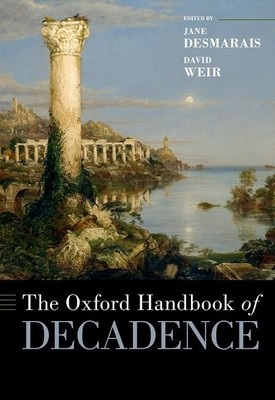
- We will send in 10–14 business days.
- Publisher: Oxford University Press, USA
- ISBN-10: 0190066954
- ISBN-13: 9780190066956
- Format: 17.9 x 25.3 x 4.5 cm, hardcover
- Language: English
- SAVE -10% with code: EXTRA
The Oxford Handbook of Decadence (e-book) (used book) | bookbook.eu
Reviews
Description
The meaning of decadence varies with context, depending on what (or who) is understood to have declined, decayed, or degenerated. These negative meanings are familiar from history (the decline and fall of Rome), sociology (the decay of communities), morality (the degeneration of values), and more, including such popular conceptions of decadence as excess and corruption. At the same time, all of this negative decadence has found positive cultural expression, principally in literature, through the work of such celebrated nineteenth-century decadents as Charles Baudelaire, Oscar Wilde, and many others. This volume takes the study of decadence beyond these canonical literary works to explore the phenomenon in broader historical, geographical, and cultural contexts.
In thirty-five chapters by esteemed scholars from a range of disciplines, the Oxford Handbook of Decadence addresses different critical periods, such as classical antiquity, various ages of empire, the interwar era in the twentieth century, and contemporary times, as well as key places--France, Belgium, Britain, Italy, Germany, the Nordic nations, Russia and Ukraine, the Ottoman Empire, and Japan--and such genres as the novel, the short story, drama, the essay, prose poetry, and film. The volume also considers decadence more broadly as a culture not limited to literature by tracing its manifestations in such material forms as book design, fashion, interior decoration, and architecture, as well as through the experiential register of the senses: decadent vision, sound, smell, taste, and touch are all reflected, respectively, in painting, music, perfume, cuisine, and feeling. Finally, the chapters explore the theoretical resonance of decadence in such fields as theology, science,ecology, politics, psychoanalysis, and philosophy. By illuminating the various ways decadence can be construed, the Handbook offers an in-depth and original exploration into the paradox of decadence: a culture that draws its creative energy from the idea of decline.
EXTRA 10 % discount with code: EXTRA
The promotion ends in 19d.05:53:03
The discount code is valid when purchasing from 10 €. Discounts do not stack.
- Publisher: Oxford University Press, USA
- ISBN-10: 0190066954
- ISBN-13: 9780190066956
- Format: 17.9 x 25.3 x 4.5 cm, hardcover
- Language: English English
The meaning of decadence varies with context, depending on what (or who) is understood to have declined, decayed, or degenerated. These negative meanings are familiar from history (the decline and fall of Rome), sociology (the decay of communities), morality (the degeneration of values), and more, including such popular conceptions of decadence as excess and corruption. At the same time, all of this negative decadence has found positive cultural expression, principally in literature, through the work of such celebrated nineteenth-century decadents as Charles Baudelaire, Oscar Wilde, and many others. This volume takes the study of decadence beyond these canonical literary works to explore the phenomenon in broader historical, geographical, and cultural contexts.
In thirty-five chapters by esteemed scholars from a range of disciplines, the Oxford Handbook of Decadence addresses different critical periods, such as classical antiquity, various ages of empire, the interwar era in the twentieth century, and contemporary times, as well as key places--France, Belgium, Britain, Italy, Germany, the Nordic nations, Russia and Ukraine, the Ottoman Empire, and Japan--and such genres as the novel, the short story, drama, the essay, prose poetry, and film. The volume also considers decadence more broadly as a culture not limited to literature by tracing its manifestations in such material forms as book design, fashion, interior decoration, and architecture, as well as through the experiential register of the senses: decadent vision, sound, smell, taste, and touch are all reflected, respectively, in painting, music, perfume, cuisine, and feeling. Finally, the chapters explore the theoretical resonance of decadence in such fields as theology, science,ecology, politics, psychoanalysis, and philosophy. By illuminating the various ways decadence can be construed, the Handbook offers an in-depth and original exploration into the paradox of decadence: a culture that draws its creative energy from the idea of decline.


Reviews